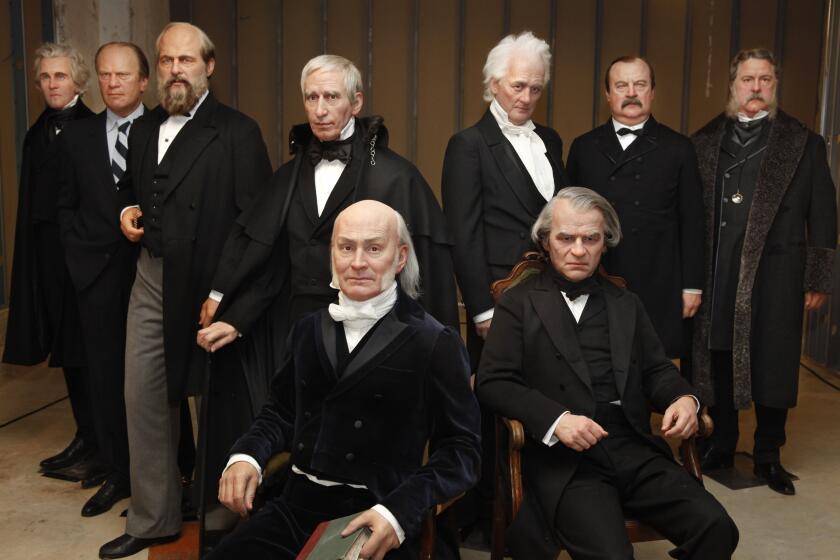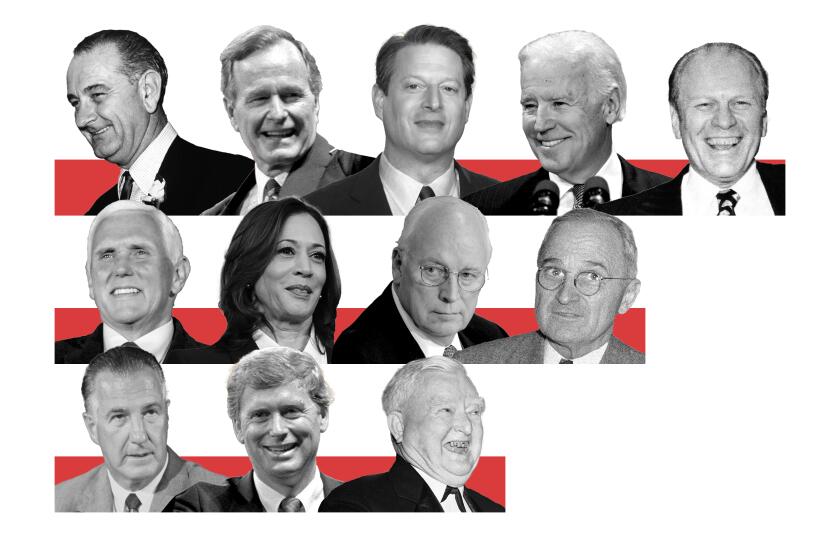Opinion: Experts once thought highly of Biden’s presidency. Here’s how his legacy is likely to change

- Share via
Our survey of presidential experts a year ago drew attention for ranking Joe Biden 14th among the presidents, ahead of such consequential chief executives as Woodrow Wilson and Ronald Reagan. At the time, many expressed surprise, if not skepticism, that the third edition of our Presidential Greatness Project had put Biden in the top third of the nation’s presidents.
True, President Biden helped lead the nation out of the COVID-19 pandemic while presiding over a series of legislative achievements, and many gave him credit for restoring important norms to the Oval Office after the tumultuous term of Donald Trump, whom the experts ranked last. But the story was unfinished, and the verdict was preliminary.
In the months following the release of our survey, voters and experts alike learned much more about Biden’s decline with age, laid bare especially by his disastrous debate performance against Trump in June. Weeks later, Biden dropped out of the race, handing the reins to Vice President Kamala Harris, who would go on to be decisively defeated by Trump.
This Presidents Day, Trumpism is affecting assessments of Obama, Reagan and others. Today’s politics have also diminished the likes of Jackson and Wilson.
Even as Biden’s administration shifted its focus to his legacy in the months since he dropped out of the race, his presidency grew more fraught. Evidence of his diminished capacity accumulated; he pardoned his son Hunter, undermining his claims to restoring upright adherence to the rule of law; and Trump and his fellow Republicans prepared to return to power and reverse much of what Biden accomplished.
Presidential legacies are a quintessentially American phenomenon; it seems that from the moment a president steps off the inaugural dais, chatter about their prospective legacy and the impact of this event or that decision begins. Those legacies remain contested well after they leave office, sometimes for many decades: Consider the continuing reassessment of presidents such as Wilson, Andrew Jackson and Ulysses S. Grant, all of whom have been out of office for well over a century.
Presidents themselves are quite aware of this. Barack Obama once observed that he and his presidential predecessors were all part of America’s long-running story and that each president just tries to get their particular paragraph right. Of course, presidents don’t write their paragraphs alone. Journalists, historians and the allies and enemies of individual presidents play significant roles in the way each is remembered and regarded.
Scholars rated the performance of the past century of veeps. Joe Biden and Al Gore scored high. Kamala Harris and Mike Pence, not so much.
Advocates of a particular president often point to the substantive accomplishments of an administration as evidence of a great legacy. Biden’s defenders, for example, argue that the American Rescue Plan, the infrastructure bill and the Inflation Reduction Act make him a momentous president, at least in the domestic sphere. But for each of those successes, there are blemishes such as Biden’s botched withdrawal from Afghanistan, his struggle with inflation and the chaotic situation at the southern border.
The reality is that while most modern presidents can lay claim to significant policy successes, most of those initiatives don’t end up being the most significant parts of history’s narrative about them. Legacies are just as much about the presidents’ political performance, their relationship with the American people, the success of their parties and the historical memory of what it was like during their time in office — the presidential vibes, as our students might say.
When we reflect on the ways presidents are remembered, more often than not their greatest policy achievements aren’t at the forefront. Gerald Ford is best remembered not for his administration’s fight against inflation or for signing campaign finance reforms but for pardoning his predecessor, Richard Nixon. Jimmy Carter’s presidency is more often defined by his malaise speech than by the 13 days he spent at Camp David negotiating a durable peace between Israel and Egypt.
Looking at Biden’s more recent predecessors is revealing. Bill Clinton’s paragraph is largely about the deepening of partisan polarization and his impeachment, while George W. Bush’s, bookended by the Florida recount and Hurricane Katrina, centers on the post-9/11 wars in Afghanistan and Iraq. Barack Obama’s paragraph is so far focused on his historic place as the first African American president and his successful push for the Affordable Care Act, along with the rise of the tea party and further polarization. Trump’s first term was marked by the COVID-19 pandemic, two impeachments and the Jan. 6 insurrection, but now that he will become the first president since Grover Cleveland to serve nonconsecutive terms, his paragraph is only half-written.
As we contemplate Biden’s legacy, it is more likely that his ranking in our most recent survey will be his high-water mark. Future assessments will have to incorporate new information not only about his deterioration but also the extent to which he and his staff kept it hidden, the administration’s ineffectual handling of the war in Gaza, the president’s low standing with the American people at the conclusion of his term and the precarious situation in which he leaves his party.
A year ago, Biden still seemed to have a chance of reelection and was credibly playing the role of defender of American democracy. Now we know that more of his paragraph will deal with the difference between what he promised — to restore a measure of normalcy after Trump and serve as a bridge to a new generation of leadership — and what he delivered: the second Trump administration.
Brandon Rottinghaus is a professor of political science at the University of Houston. Justin Vaughn is an associate professor of political science at Coastal Carolina University.
More to Read
A cure for the common opinion
Get thought-provoking perspectives with our weekly newsletter.
You may occasionally receive promotional content from the Los Angeles Times.












